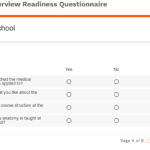The MMI Interview tips may save you the heartache of not doing the obvious things during your MMI Interview. With so many universities now using the internet to hold these interviews you need to adapt your communication skills accordingly. The obvious body language cues which would provide you with valuable information about the mood of your interviewer are simply not there.
Improving your interview skills is a slow process so you need to start preparing early and use an organised, methodical approach – improving one skill at a time. Use the quick hints and tips below to get a head start on what to look out for and how to subtly influence the interviewer.
MMI Interview Hints and Tips
- Use your full name during your introduction. Don’t just use your first name this will put you in an unprofessional light and not provide you with the respect you deserve – to be invited to an interview means you are worth interviewing !
- Dress the part, act the part, Treat it as as the real thing. Guess what you will be doing the real thing and need to practice as if it is the real thing.
- Lighting, environment, microphone, webcam, internet connection. TEST, TEST. Can you hear me? Am I on mute? Do a trial run using the platform you’ll be using. Whether its MS Teams or Zoom you need to connect to a friend and see if your connection is stable and you can be heard over the net – you can also use some of the free tools on line that will check your computer and internet speeds. Any problems with connectivity
- Be careful when using virtual backgrounds since it comes across unnatural and distracting especially when your hair disappears and merges in with the virtual objects behind you.
- Use a laptop; if you have to use a phone put it on a stand. DO NOT hold it. The worse thing you can do is hold the phone and be moving it all over or shake it as you’re answering a difficult question.
- Make sure you don’t have any background noise – the one thing that will distract and irritate the interviewer is loud banging or a barking dog.
- Try to think about different ways of answering questions – for instance rather than responding to “Tell me about yourself” in a traditional way you could start off by talking about what “gets you out of bed”.
- When drinking water use a cup or a glass. Do not hydrate using a water bottle since you will end up revealing to much of you neck. Also do not drink to much so you need to take a break.
- Dress for the day – get yourself into the right mindset so make sure you’re dressed top to bottom. Your clothes should be smart but not over the top. Move your hands but don’t move them back and forth towards the camera. Smile but don’t laugh hysterically.
- Eye contact is crucial and your whole face needs to be in view. Look at the camera so that they can see how bright your eyes are. Don’t worry about freezing but stay focused and take a breath and start again.
- The virtual distance does make it more difficult to connect. Your facial expressions are key along with your posture – never slouch and stay actively engaged in the conversation. Smile and nod to show you are still listening to the questionnaire.
- Since this is online you can’t read body language so you need to make sure you provide the interviewer a time to ask questions but make sure you give a full detailed answer concisely.
- Take your time during preparation to tell your stories out loud – with enthusiasm. The more you practice out loud the more confident you will become.
- Practice timing – make sure you know how long your interview is – or for MMI interviews how long each station is. Be sure to provide an answer and address the question but also provide enough information to show that you can think critically.
- Tell me about yourself? Why you want to be a doctor? Why interested in this role? Why are you applying here here? Ultimate career goal? Most important characteristics of a doctor? What’s the greatest adversity you’ve had and how did you overcome it? What past experience of trained you for this position? How would you handle conflict? Give as much personal insight and stories as possible. They want to know as much as possible in as little time as possible.
- Don’t sound robotic and rehearse every word – rather use themes and use it to determine what to talk about rather than trying to memorise what to say. Get your brain trained to talk like this by picking random topics and talk to someone out loud about them.
- Never take an extreme position unless it is absolutely necessary or completely obvious to do. If you shouw a lack of flexibility or any sort of overbearing bias towards a particularly perspective then you may trigger a “concern” flag which could make you seem as a mismatch for medicine. You should always take a more inclusive approach and look for the best in a situation looking at each circumstance individually without your own negative experiences or stereotypes playing a role.
- The great thing about MMI interviews is that each station is independent and the interviewer has no idea if the last station was a total mess ! What this means for you is a fresh slate but its down to your ability to stay in the moment and not let a previous station effect this one. Another advantage is you can reuse material but make sure the same scenario or experience applies.
- Stay positive and confident. Don’t give up – treat adversity as training and you will be successful.
Final Words

The key is to practice one skill at a time until it becomes second nature. There is no point trying to fix everything in your interview technique because most likely you’ll be chasing your tail. A better strategy is to try and master one area so you can use it in the interview without even consciously trying. Feedback from this site will give you a much needed independent view but it is always good to self reflect and try to appreciate what the assessor is looking for.
This is not an academic test where you can simply revise a lot and it will naturally flow out of your mouth, rather this requires emotional intelligence, self awareness, and critical analysis – you must be able to think on your feet. The best way to get these skills isn’t through practicing in the mirror – although that can help – but by practicing random interview questions daily to a family member or friend. Ask for honest feedback and reflect on your performance yourself also. A lot of the time we don’t have anyone in the family who can do this so this is where this site comes in – we provide a professional online interview services using our propriety online student.






